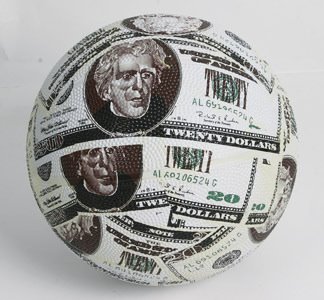
Aug 7, 2013
Minnesota Timberwolves center Nikola Pekovic hasn’t re-signed yet. His contract was expected to be signed by now, but there’s been a slight holdup. If you’re not sure why he hasn’t signed yet, you probably didn’t see the title of my article. Scroll up and take a peek – that’s correct, he wants more money. But it’s not just Pek who wants more cash; every sports athlete out there voices his concerns over his contract situation.
In sports today, if a player wants more money they usually face scrutiny from fans. In the average fan’s mind, the problem isn’t whether or not the player deserves the money or not, the problem is the player already has plenty money. If you were to ask someone about the money situation with pro athletes, you’d hear a variety of responses:
- “They shouldn’t be driven by money.”
- “Is there really that big of a difference between 52 million and 48 million dollars?”
- “They make way too much money as is; they should just shut up and play.”
I don’t blame the average fan for having these thoughts and ideas. I expect them to have this opinion, as we live in a society today that says money is evil. We’ve been driven to believe that the rich should feel guilty for their very existence.
Most people are forgetting how important money is. It’s essentially green little pieces of oxygen, keeping you alive as you suck it into your bank accounts. It pays our bills, buys our food, keeps shelter over our head, and sets our family and loved ones up for their future lives.
The idea that pro athletes shouldn’t be compelled to earn more money is unfair, as they’re not the only ones. In fact, the average person is commended when they are motivated by money. Does the average man or woman come home and feel guilty or ashamed after getting a big promotion at work? If someone works their tail off all day at work for years and years for a promotion, do we look down upon them for being focused on money?
Since when should the amount of money matter? If we’re going to praise a store manager for fighting for a pay-raise from $40k to $45k, yet scold an athlete for fighting for a raise from $34 mil to $36 mil; should we not also be scolding the store manager, as his salary is heaps more than say a fast food worker?
If you’ve seen the 2005 Russell Crowe movie ‘Cinderella Man’, you likely rooted for a character who fought solely for money. He was struggling to keep his children fed and healthy due to financial issues, and that was his number one reason for becoming a boxing champion. Certainly not every pro athlete has the same financial situation as James Braddock (Russell Crowe’s character in the movie), but that doesn’t mean they don’t exist. Dennis Rodman is an example of someone who might not have been the most physically gifted, but because he was sick of being dirt-poor, he fought his way into the NBA.
The notion that an athlete should worry little about the difference between $52 and $48 million is also faulty logic. Firstly, let me show you how much 4 million dollars is:
X = 100 dollars.
xxxxxxxxxxxxxxxxx xxxxxxxxxxxxxxxxx xxxxxxxxxxxxxxxxx xxxxxxxxxxxxxxxxx
That first line is 6800 dollars.
xxxxxxxxxxxxxxxxx xxxxxxxxxxxxxxxxx xxxxxxxxxxxxxxxxx xxxxxxxxxxxxxxxxx
xxxxxxxxxxxxxxxxx xxxxxxxxxxxxxxxxx xxxxxxxxxxxxxxxxx xxxxxxxxxxxxxxxxx
xxxxxxxxxxxxxxxxx xxxxxxxxxxxxxxxxx xxxxxxxxxxxxxxxxx xxxxxxxxxxxxxxxxx
xxxxxxxxxxxxxxxxx xxxxxxxxxxxxxxxxx xxxxxxxxxxxxxxxxx xxxxxxxxxxxxxxxxx
xxxxxxxxxxxxxxxxx xxxxxxxxxxxxxxxxx xxxxxxxxxxxxxxxxx xxxxxxxxxxxxxxxxx
There’s $34,000 dollars above me. We haven’t even broken $100k. Imagine this screen filling up $4 million dollars. To the average person, the difference between having $48 million and $52 million dollars might seem miniscule, but to someone within that financial income range, it’s highly important. You wouldn’t tell someone to “not worry” about the difference between making $12/hour and $16/hour, so why do athletes receive this punishment?
Finally, money shouldn’t always dictate how we’re allowed to feel. A video of Kevin Garnett crying about losing games in the NBA found its way to a basketball internet message board. The immediate comments were along the lines of, “I’m sure he’ll cry his eyes out in his mansion tonight,” or “It must be so tough to be a multi-millionaire.” The majority of fans chose to attack the pro athlete for feeling down on his luck simply because he has a lot of money. Who are we to say who gets to have feelings? Who are we to dictate which type of people can show emotion or vulnerability? I think this comes from our society today, as sayings like ‘first world problems’ have become a staple in our attacks against privileged people having problems. When is it okay for someone to feel sad? If my dog dies, do I have to hold in my tears because somewhere out there someone’s mom died? If my mom dies do I have to tough it out because somewhere in the world somebody’s whole family has just died? Can someone in the United States of America ever allow him or herself to succumb to the pressures of debt without an outside observer scolding them because there’s starving kids elsewhere in the world?
When we read about the Nicola Pekovics of the world asking for money, our thoughts should remain along the lines of “Good for him. He’s fighting for something that is important, and he has earned it.”


